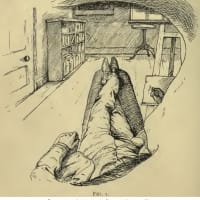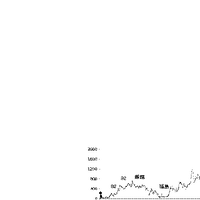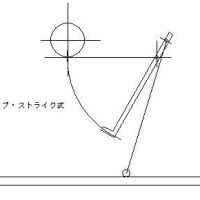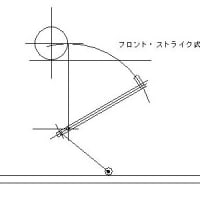http://www.archive.org/details/principleseconom01milluoft
Internet Archive: Details: Principles of political economy : with some of their applications to social philosophy
428 BOOK II. CHAPTER XL 3.
labouring family enjoys in abundance the necessaries, many
of the comforts, and some of the luxuries of life ; and, unless
in case of individual misconduct, or actual inability to work,
poverty does not, and dependence need not, exist. A
similar advantage, though in a less degree, is occasionally
enjoyed by some special class of labourers in old countries,
from an extraordinarily rapid growth, not of capital gene
rally, but of the capital employed in a particular occupation.
So gigantic has been the progress of the cotton manufacture
since the inventions of Watt and Arkwright, that the capital
engaged in it has probably quadrupled in the time which
population requires for doubling. While, therefore, it has
attracted from other employments nearly all the hands which
geographical circumstances and the habits or inclinations of
the people rendered available ; and while the demand it
created for infant labour has enlisted the immediate pecu
niary interest of the operatives in favour of promoting, instead
of restraining, the increase of population ; nevertheless wages
in the great seats of the manufacture are generally so high,
that the collective earnings of a family amount, on an average
of years, to a very satisfactory sum ; and there is, as yet, no
sign of permanent decrease, while the effect has also been felt
in raising the general standard of agricultural wages in the
counties adjoining.
* But those circumstances of a country, or of an occupation,
in which population can with impunity increase at its utmost
rate, are rare, and transitory. Very few are the countries
presenting the needful union of conditions. Either the in
dustrial arts are backward and stationary, and capital there
fore increases slowly ; or the effective desire of accumulation,
being low, the increase soon reaches its limit; or, even though
both these elements are at their highest known degree, the
increase of capital is checked, because there is not fresh land
to be resorted to, of as good quality as that already occu
pied. Though capital should for a time double itself simul
taneously with population, if all this capital and population
WAGES. 429
are to find employment on the same land, they cannot with
out an unexampled succession of agricultural inventions
continue doubling the produce ; therefore, if wages do not
fall, profits must ; and when profits fall, increase of capital
is slackened. Besides, even if wages did not fall, the price of
food (as will be shown more fully hereafter) would in these
circumstances necessarily rise ; which is equivalent to a fall of
wages.
* Except, therefore, in the very peculiar cases which I have
just noticed, of which the only one of any practical impor
tance is that of a new colony, or a country in circumstances
equivalent to it ; it is impossible that population should
increase at its utmost rate without lowering wages. Nor
will the fall be stopped at any point, short of that which
either by its physical or its moral operation, checks the
increase of population. In no old country, therefore, does
population increase at anything like its utmost rate ; in
most, at a very moderate rate : in some countries, not at
all. These facts are only to be accounted for in two ways.
Either the whole number of births which nature admits of,
and which happen in some circumstances, do not take place ;
or if they do, a large proportion of those who are born, die.
The retardation of increase results either from mortality
or prudence; from Mr. Malthus s positive, or from his pre
ventive check : and one or the other of these must and does
exist, and very powerfully too, in all old societies. Wherever
population is not kept down by the prudence either of indi
viduals or of the state, it is kept down by starvation or
disease.
----------------------------------
COST OF PRODUCTION. 559
fold quantity ; but he does not buy more steam-engines be
cause the price is lowered. His demand for steam-engines is
almost always predetermined by the circumstances of his situa
tion. So far as he considers the cost at all, it is much more
the cost of working this engine than the cost upon its purchase.
But there are many articles for which the market is abso
lutely and merely limited by a pre-existing system, to which
those articles are attached as subordinate parts or members.
How could we force the dials or faces of timepieces by arti
ficial cheapness to sell more plentifully than the inner works
or movements of such timepieces ? Could the sale of wine-
vaults be increased without increasing the sale of wine ? Or
the tools of shipwrights find an enlarged market whilst ship
building was stationary ? .... Offer to a town of 8000 inha
bitants a stock of hearses, no cheapness will tempt that town
into buying more than one. Offer a stock of yachts, the
chief cost lies in manning, victualling, repairing ; no dimi
nution upon the mere price to a purchaser will tempt into
the market any man whose habits and propensities had not
already disposed him to such a purchase. So of professional
costume for bishops, lawyers, students at Oxford." Nobody
doubts, however, that the price and value of all these things
would be eventually lowered by any diminution of their
cost of production ; and lowered through the apprehension
entertained of new competitors, and an increased supply ;
though the great hazard to which a new competitor would
expose himself, in an article not susceptible of any consi
derable extension of its market, would enable the esta
blished dealers to maintain their original prices much longer
than they could do in an article offering more encouragement
to competition.
-------------------------------------
APPENDIX. 613
tion by the country people. They have less animal food, in pro
portion, to spare for the towns, because they retain more of it for
their own use.
On what evidence is it asserted that small properties imply defi
ciency of cattle, and consequent deficiency of manure ? That they
are not favourable to sheep farming seems to be admitted ; yet in
France, as well as in the United Kingdom, the number of sheep
has doubled in the course of a century.* It is true that in quality,
instead of the extraordinary improvement which has taken place
in England, they have remained almost stationary. But the breeding
and fattening of horned cattle is so perfectly compatible with small
capital, that in the opinion of many Continental authorities, small
farms have the advantage in this respect, and so great an advantage
as to be more than a compensation for their inferiority in sheep .f
It is argued that the petite propriete must diminish the number
of cattle, because it leads to the breaking up of natural pasture.
But when natural pasture is fit for the plough, a greater number
of cattle than were supported on the whole, may be supported on
a part, by laying it out in roots and artificial grasses ; and it is
well known that on the stall-feeding system there is much greater
preservation of manure. The question of petite culture, in rela
tion to cattle, is, in fact, one and the same with the question of stall-
feeding. The two things must stand or fall together. Stall-feeding
produces, cceteris paribus, a greater quantity of provisions, but in
the opinion of most judges a lower quality. Experience must
decide.
Internet Archive: Details: Principles of political economy : with some of their applications to social philosophy
428 BOOK II. CHAPTER XL 3.
labouring family enjoys in abundance the necessaries, many
of the comforts, and some of the luxuries of life ; and, unless
in case of individual misconduct, or actual inability to work,
poverty does not, and dependence need not, exist. A
similar advantage, though in a less degree, is occasionally
enjoyed by some special class of labourers in old countries,
from an extraordinarily rapid growth, not of capital gene
rally, but of the capital employed in a particular occupation.
So gigantic has been the progress of the cotton manufacture
since the inventions of Watt and Arkwright, that the capital
engaged in it has probably quadrupled in the time which
population requires for doubling. While, therefore, it has
attracted from other employments nearly all the hands which
geographical circumstances and the habits or inclinations of
the people rendered available ; and while the demand it
created for infant labour has enlisted the immediate pecu
niary interest of the operatives in favour of promoting, instead
of restraining, the increase of population ; nevertheless wages
in the great seats of the manufacture are generally so high,
that the collective earnings of a family amount, on an average
of years, to a very satisfactory sum ; and there is, as yet, no
sign of permanent decrease, while the effect has also been felt
in raising the general standard of agricultural wages in the
counties adjoining.
* But those circumstances of a country, or of an occupation,
in which population can with impunity increase at its utmost
rate, are rare, and transitory. Very few are the countries
presenting the needful union of conditions. Either the in
dustrial arts are backward and stationary, and capital there
fore increases slowly ; or the effective desire of accumulation,
being low, the increase soon reaches its limit; or, even though
both these elements are at their highest known degree, the
increase of capital is checked, because there is not fresh land
to be resorted to, of as good quality as that already occu
pied. Though capital should for a time double itself simul
taneously with population, if all this capital and population
WAGES. 429
are to find employment on the same land, they cannot with
out an unexampled succession of agricultural inventions
continue doubling the produce ; therefore, if wages do not
fall, profits must ; and when profits fall, increase of capital
is slackened. Besides, even if wages did not fall, the price of
food (as will be shown more fully hereafter) would in these
circumstances necessarily rise ; which is equivalent to a fall of
wages.
* Except, therefore, in the very peculiar cases which I have
just noticed, of which the only one of any practical impor
tance is that of a new colony, or a country in circumstances
equivalent to it ; it is impossible that population should
increase at its utmost rate without lowering wages. Nor
will the fall be stopped at any point, short of that which
either by its physical or its moral operation, checks the
increase of population. In no old country, therefore, does
population increase at anything like its utmost rate ; in
most, at a very moderate rate : in some countries, not at
all. These facts are only to be accounted for in two ways.
Either the whole number of births which nature admits of,
and which happen in some circumstances, do not take place ;
or if they do, a large proportion of those who are born, die.
The retardation of increase results either from mortality
or prudence; from Mr. Malthus s positive, or from his pre
ventive check : and one or the other of these must and does
exist, and very powerfully too, in all old societies. Wherever
population is not kept down by the prudence either of indi
viduals or of the state, it is kept down by starvation or
disease.
----------------------------------
COST OF PRODUCTION. 559
fold quantity ; but he does not buy more steam-engines be
cause the price is lowered. His demand for steam-engines is
almost always predetermined by the circumstances of his situa
tion. So far as he considers the cost at all, it is much more
the cost of working this engine than the cost upon its purchase.
But there are many articles for which the market is abso
lutely and merely limited by a pre-existing system, to which
those articles are attached as subordinate parts or members.
How could we force the dials or faces of timepieces by arti
ficial cheapness to sell more plentifully than the inner works
or movements of such timepieces ? Could the sale of wine-
vaults be increased without increasing the sale of wine ? Or
the tools of shipwrights find an enlarged market whilst ship
building was stationary ? .... Offer to a town of 8000 inha
bitants a stock of hearses, no cheapness will tempt that town
into buying more than one. Offer a stock of yachts, the
chief cost lies in manning, victualling, repairing ; no dimi
nution upon the mere price to a purchaser will tempt into
the market any man whose habits and propensities had not
already disposed him to such a purchase. So of professional
costume for bishops, lawyers, students at Oxford." Nobody
doubts, however, that the price and value of all these things
would be eventually lowered by any diminution of their
cost of production ; and lowered through the apprehension
entertained of new competitors, and an increased supply ;
though the great hazard to which a new competitor would
expose himself, in an article not susceptible of any consi
derable extension of its market, would enable the esta
blished dealers to maintain their original prices much longer
than they could do in an article offering more encouragement
to competition.
-------------------------------------
APPENDIX. 613
tion by the country people. They have less animal food, in pro
portion, to spare for the towns, because they retain more of it for
their own use.
On what evidence is it asserted that small properties imply defi
ciency of cattle, and consequent deficiency of manure ? That they
are not favourable to sheep farming seems to be admitted ; yet in
France, as well as in the United Kingdom, the number of sheep
has doubled in the course of a century.* It is true that in quality,
instead of the extraordinary improvement which has taken place
in England, they have remained almost stationary. But the breeding
and fattening of horned cattle is so perfectly compatible with small
capital, that in the opinion of many Continental authorities, small
farms have the advantage in this respect, and so great an advantage
as to be more than a compensation for their inferiority in sheep .f
It is argued that the petite propriete must diminish the number
of cattle, because it leads to the breaking up of natural pasture.
But when natural pasture is fit for the plough, a greater number
of cattle than were supported on the whole, may be supported on
a part, by laying it out in roots and artificial grasses ; and it is
well known that on the stall-feeding system there is much greater
preservation of manure. The question of petite culture, in rela
tion to cattle, is, in fact, one and the same with the question of stall-
feeding. The two things must stand or fall together. Stall-feeding
produces, cceteris paribus, a greater quantity of provisions, but in
the opinion of most judges a lower quality. Experience must
decide.
























